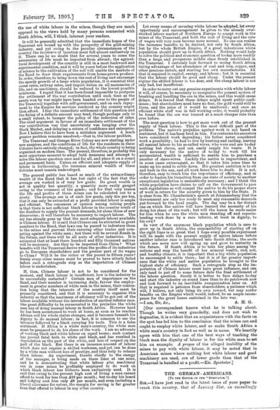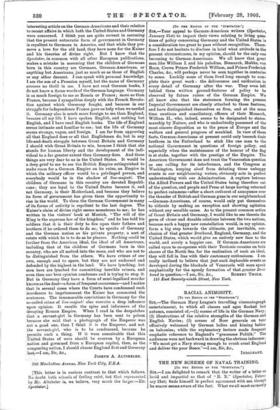THE GERMAN - AMERICANS.
[To :HS EDITOR OP TEE "SPEcUrToi.°] Slit,•—.1 have just read in the latest issue of your paper to reach this country, that of January 31st, an .exceedingly interesting article on the German-Americans and their relation to recent affairs in which both the United States and Germany were concerned. I think you are quite correct in assuming that the present autocratic form of government in Germany is repellent to Germans in America, and that while they pre- serve a love for the old land, they have none for the Kaiser and his theories of divine right. But I know that the Spectator, in common with all other European publications, makes a mistake in assuming that the children of Germans born in this country are Germane, German-Americans, or anything but Americans, just as much so as those of English or any other descent. I can speak with personal knowledge. I am the son of a Prussian myself, but the name of Germany arouses no thrill in me. I have not read German books, I do not know a dozen words of the German language. Germany is as much foreign to me as Russia or France ; more so than France, because I sympathise deeply with the French Revolu- tion against which Germany fought, and because in our struggle for independence France gave us help when we needed it. Germany also is much more foreign to me than England, because all my life I have spoken English, and nothing but English, and I have read English books. The life of England seems intimate and familiar to me ; but the life of Germany seems strange, vague, and foreign. I am far from approving all that England does or all that Englishmen do, but in any life-and-death struggle between Great Britain and Germany I should wish Great Britain to win, because I think that she stands for human liberty and the development of the indi- vidual to a far greater extent than Germany does. And these things are very dear to us in the United States. It would be a deep grief to me to see the British Empire extinguished to make room for a German Empire on its ruins, an Empire in which the military officer would be a privileged person, and everybody would be in the shadow of lese-majeste. The children of Germans in this country are devoted Republi- cans ; they are loyal to the United States because it, and not Germany, is their Motherland, and because they believe its form of government has given them the opportunity to rise in the world. To them the German Government in many of its forms of activity is repellent to the last degree. The Kaiser's claim of divine right seems monstrous to me; he has written in the visitors' book at Munich, " The will of the King is the supreme law of the kingdom," and he has told his soldiers that it is their duty to fire upon their fathers and brothers if he ordered them to do so ; he speaks of Germany and the German nation as his private property, a sort of estate with which he is to do as he pleases. Nothing could be further from the American ideal, the ideal of all Americans, including that of the children of Germans horn in this country, who are all melted into the mass, and who are not to be distinguished from the others. We have crimes of our own, enough and to spare, but they are not endorsed and defended by the highest in the land. We have lynching, but men here are lynched for committing horrible crimes, and even then our best opinion condemns and is trying to stop it. But in Germany they have a form of semi-legalised murder known as the duel—a form of frequent occurrence—and I notice that in several cases where the Courts have condemned such murderers to imprisonment the Kaiser has commuted the sentences. The innumerable convictions in Germany for the so-called crime of lese-majeste also exercise a deep influence upon opinion. It recalls the spies and informers of the decaying Roman Empire. When I read in the despatches that a servant-girl in Germany has been sent to prison because she said that a photograph of the Emperor was not a good one, then I think it is the Emperor, and not the servant-girl, who is to be condemned, because he permits such a thing. If it were conceivable that this United States of ours should be overrun by a European nation and governed from a European capital, then, as the conquering nation, I should choose England first and Germany 320 Manhattan Avenue, New York City, U.S.A.
[This letter is in curious contrast to that which follows. No doubt both schools of feeling exist, but that represented by Mr. Altsheler is, we believe, very much the larger.—En. Spectator.]











































 Previous page
Previous page